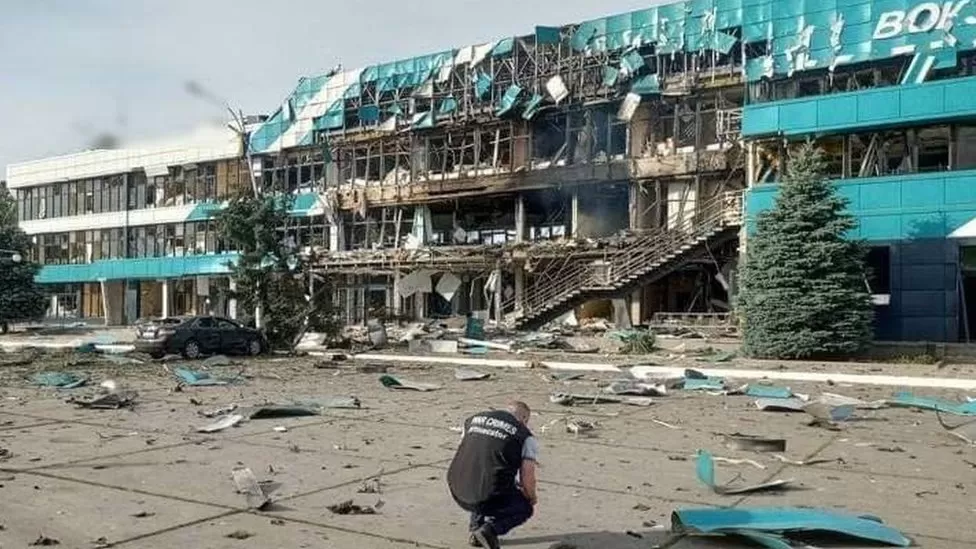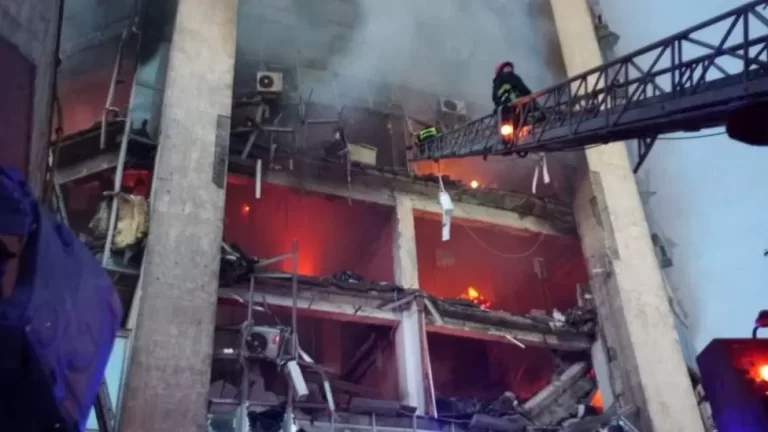A Russian drone strike has hit Ukrainian port facilities at Izmail on the River Danube, a short distance from Nato member state Romania.
A grain warehouse, a passenger building and an elevator for loading grain have all been damaged.
Russia began targeting Ukraine's ports after abandoning a UN deal that enabled both countries to export grain safely across the Black Sea.
A large fire raged from the port area of Izmail early on Wednesday.
Video, filmed from the Romanian side of the Danube roughly 3km (1.9 miles) away, showed the extent of the fire. Romanian President Klaus Iohannis condemned Russia's continued attacks on Ukrainian infrastructure “in the proximity of Romania” as unacceptable.
Ukraine's air force said during the night that Russian drones were heading for the Danube river, where Ukraine has two ports, Izmail and Reni.
Ukraine's military command in the south said air defences had been operating for almost three hours.
Odesa regional leader Oleh Kiper said emergencies services were working on the site of the latest Russian attack, and there were no reports of any casualties. President Volodymyr Zelensky said that “unfortunately there has been damage” – and the regional chief posted several images on social media indicating that several structures had been hit.
- Russia's new tactic for cutting off Ukraine's grain
Ukraine's defence ministry said an elevator had been hit – and officials said the Izmail district prosecutor had launched an investigation into a cargo terminal, a warehouse and an elevator that were all damaged, without detailing exactly where in the Odesa region.
Last week Russian drones also attacked grain warehouses in Reni, further up the River Danube and also next to Romanian territory.
President Iohannis said on Wednesday that the attacks so close to Romania were war crimes that further affected Ukraine's “capacity to transfer their food products towards those in need in the world”. Russia had earlier attacked the big Black Sea ports of Odesa and Chornomorsk, where authorities said 60,000 tonnes of grain were destroyed.

Russia's President Vladimir Putin has been accused by the West of “weaponising” food. But in a phone-call with Turkey's president on Wednesday he stressed that he would not return to the UN deal until Russia's own exports of grain and fertiliser were guaranteed.
When it pulled out of the grain deal on 17 July, Russia threatened to target any vessels heading towards Ukraine's Black Sea ports, essentially imposing a naval blockade.
Ships have continued to sail across the Black Sea to Ukraine's ports on the Danube, which has grown in importance as an alternative.
Ukraine is one of the world's major exporters of wheat and corn, and the bulk of the shipments had been moving from the country's Black Sea ports.
Now that Ukraine is unable to use its main Black Sea ports, the smaller-capacity Danube ports have become pivotal for its exports.
- What was the Ukraine grain deal?
Grain can reach the Danube by road or rail via Moldova as well as Ukraine. Once it gets to the Danube, much of the grain is transported by river to the Romanian Black Sea port of Constanta, from where it can be safely exported south. Although Ukraine's seaports' register still listed Izmail as open on Wednesday, sources told Reuters news agency that operations there had been suspended.
Grain is also exported over land via Poland.
Ukraine has been looking into other possible routes with the help of European Union “solidarity lanes”. This week Ukrainian Foreign Minister Dmytro Kuleba said he had agreed with Croatia on the possibility of using its ports on the Danube and Adriatic Sea.
Moving Ukrainian grain across EU countries has become a difficult domestic issue for several states because of its impact on local markets. Poland and Romania are among EU members that have temporarily banned the sale of Ukrainian wheat and maize on domestic markets, while allowing transit elsewhere.
Wheat prices spiked on world markets immediately after the Russian withdrawal from the grain deal. There are now also concerns about global food security, especially for impoverished African and Asian nations.
Overnight, Russia also launched more than 10 drones against Ukraine's capital Kyiv, local officials say. All the projectiles were destroyed by anti-aircraft systems but several non-residential buildings were damaged by falling debris, the officials say.
Russia has so far not publicly commented on the reported attacks.
— CutC by bbc.com


